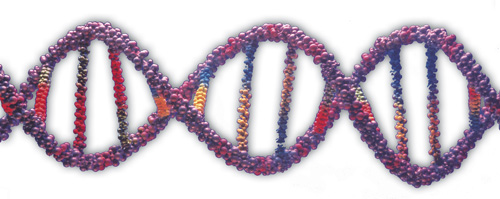|
[home] [subscription form] [cover story] [introduction] [people and places] [medical spa destinations]
|
||

VOLUME 2007 chapter 2
Brain Adapts to Respond to Psychological Stress
In humans, stress can play a major role in the development of a variety of mental illnesses, including post-traumatic stress disorder (PTSD) and depression. Research completed by Vaishnav Krishnan, of The University of Texas Southwestern Medical Center (Dallas, TX USA) and colleagues have found that, in a mouse model, the ability to adapt to stress is driven by a distinctly different molecular mechanism than is the tendency to be overwhelmed by stress. Dr. Krishnan and team also mapped out the mechanisms – components of which are also present in the human brain – that govern both kinds of responses. Study co-author Eric Nestler commented that: "The fact that we could increase the animals' ability to adapt to stress … means it may be possible to develop compounds that improve resilience. This is as great opportunity to explore potential ways of increasing stress-resistance in people faced with [stressful] situations."
[Krishnan V, Han MH, Graham DL, Berton O, Renthal W, Russo SJ, Laplant Q, Graham A, Lutter M, Lagace DC, Ghose S, Reister R, Tannous P, Green TA, Neve RL, Chakravarty S, Kumar A, Eisch AJ, Self DW, Lee FS, Tamminga CA, Cooper DC, Gershenfeld HK, Nestler EJ. "Molecular adaptations underlying susceptibility and resistance to social defeat in brain reward regions." Cell. 2007 Oct 19;131(2):391-404.]
Dr Klatz remarks: "Psychological stress is an insidious trigger of disease. People who are unable to relieve daily stress suffer a variety of health consequences, most commonly fatigue, frequent headaches, and stomach upset. The emotional response of stress is a function of the release of the hormone, cortisol. In times of stress, the adrenal glands atop the kidneys release cortisol. Unfortunately, long-term cortisol release accelerates the aging process. Unrestrained cortisol secretion can inhibit immunity, slow protein synthesis (necessary for tissue repair), lead to loss of nerve cells, brain damage, bone loss, muscle wasting, increase in abdominal fat, Type 2 diabetes, psychosis, premature aging, and death. Long-term oversecretion of cortisol due to chronic prolonged stress can lead to hypertension and hypoglycemia, both with deadly consequences. It's important for everyone to identify their individual triggers of stress, and to develop ways to avoid flipping the stress switch."
Discovery of Gene Associated with Lifespan AND Healthspan
Recent studies have shown that changes in insulin/insulin-like growth factor1 (IGF-1) signaling can increase the lifespan of mammals. In a study conducted by Domenic Withers, of the Centre for Research and Ageing at University College London, and colleagues, researchers found that male mice without a gene called IRS-1 lived 20% longer. Female mice without the gene had even better longevity, living 30% longer on average. In addition to longer lives, the mice absent of the IRS-1 gene were much healthier as they aged, maintaining good immune function, healthy skin and bones, and good eyesight. IRS-1 is involved in regulating the function of insulin, and this study contributes to a growing body of scientific data suggesting a link between the genes that regulate insulin and how well an animal ages. This study is the first to show that mammals can stay healthy as they live longer.
[Selman C, Lingard S, Choudhury AI, Batterham RL, Claret M, Clements M, Ramadani F, Okkenhaug K, Schuster E, Blanc E, Piper MD, Al-Qassab H, Speakman JR, Carmignac D, Robinson IC, Thornton JM, Gems D, Partridge L, Withers DJ. Evidence for lifespan extension and delayed age-related biomarkers in insulin receptor substrate 1 null mice. FASEB J. 2007 Oct 10; [Epub ahead of print]]
Dr. Goldman observes: "This study is groundbreaking in that it clearly demonstrates the capacity to delay the onset of age-related illnesses such as osteoporosis, diabetes, and poor immune function. If scientists find a way to manipulate the IRS-1 gene in humans, the benefits to healthspan and lifespan could be unprecedented."
Low Testosterone in Men Linked to Earlier Death
Declining testosterone levels in aging men are suspected to be an underlying cause of many of the symptoms and diseases of aging. A study completed by Gail A. Laughlin, of the University of California/San Diego (USA), and colleagues, has found that older men with low levels of testosterone may die earlier than their age-matched counterparts having normal testosterone levels. In addition, insufficient levels of circulating testosterone were found to contribute to abdominal obesity and metabolic syndrome. [Laughlin GA, Barrett-Connor E, Bergstrom J. "Low Serum Testosterone and Mortality in Older Men." J Clin Endocrinol Metab. 2007 Oct 2; [Epub ahead of print]
Dr. Klatz comments: "Testosterone levels in men decrease gradually over time, due to factors such as reduced activity, nutritional deficiency, diabetes, and HGH deficiency. This phenomenon is sometimes referred to as andropause. By age 60, many men have less than half the level of testosterone as they did when they were in their teens. Testosterone replacement therapy (TRT) has a multitude noteworthy benefits, including to increase lean body mass, decrease fat mass, improve cholesterol profile, including to decrease "bad" cholesterol (LDL), reduce bone fractures, improve cognitive functions, including visual spatial perception, improve mood, including remission of depression, as well as to boost sexual performance. Seek the guidance of a qualified anti-aging physician, preferably one who has been certified by the American Board of Anti-Aging & Regenerative Medicine (ABAARM).

